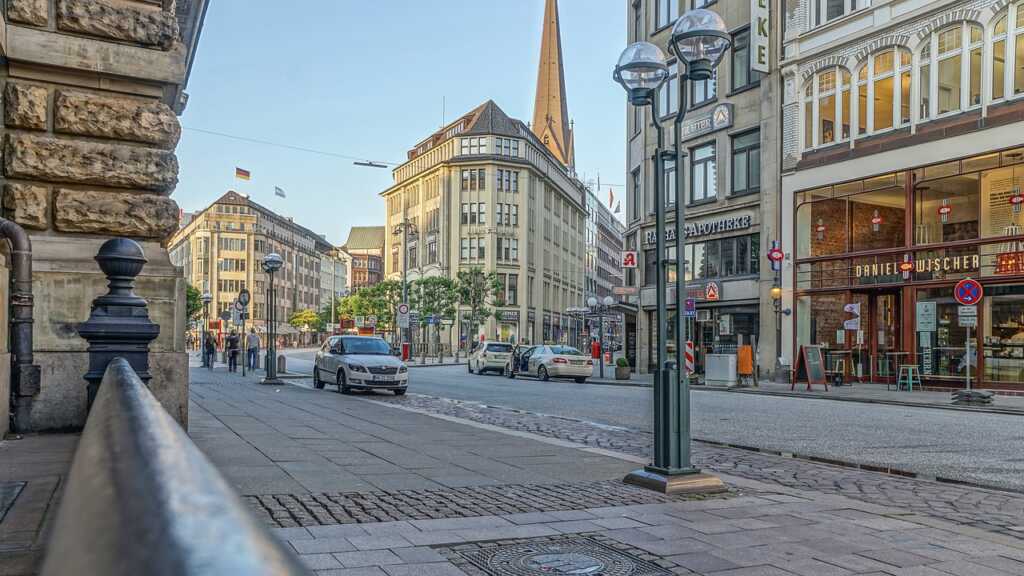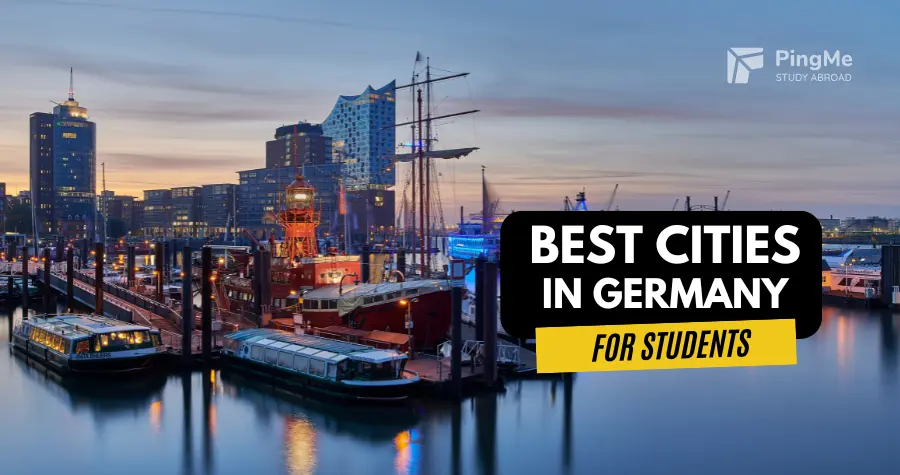August 28, 2024
Top Student Cities in Germany: Comparing Berlin, Munich, and Hamburg
Studying in Germany offers a unique and enriching experience, with each city providing its distinct atmosphere and lifestyle. The country is home to diverse cities, each with its vibe, making it an attractive destination for international students. Berlin, the capital, exudes a dynamic and cosmopolitan energy, known for its rich history, thriving arts scene, and vibrant nightlife. It's a city where creativity and innovation flourish, perfect for students seeking a lively and diverse environment. In contrast, Munich offers a more traditional and polished ambiance, known for its blend of modernity and Bavarian charm. World-class universities like the Technical University of Munich (TUM), provide a balance of academic rigor and cultural richness, all set against the backdrop of stunning Alpine landscapes. Hamburg, the maritime city, offers a cool and relaxed vibe, with its historic harbor, scenic waterways, and music scene. It’s an ideal choice for students who appreciate a mix of urban life and nature.
These cities exude a quintessentially academic and picturesque charm, with their historic universities and beautiful old towns. Regardless of the city, students can immerse themselves in German culture by learning the language, participating in local traditions, and exploring the rich history and landscapes that define Germany. Each city brings its vibe, shaping not only the educational experience but also the personal growth and cultural understanding of every student. Now let's explore the unique characteristics of each city in greater depth, highlighting how they shape the student experience in Germany.
Berlin
Berlin's allure as a top destination for students lies in its unique blend of history, culture, innovation, and opportunity. The city's magnetic pull comes from its dynamic and inclusive atmosphere, where diversity is celebrated and creativity thrives. Berlin is a hub for art, and technology, offering students access to some of the world’s leading universities, such as Humboldt University and the Technical University of Berlin. The city’s rich history, visible in iconic landmarks like the Brandenburg Gate and the Berlin Wall, provides an educational experience beyond the classroom, immersing students in the stories that have shaped modern Europe. Berlin’s vibrant arts scene, thriving start-up culture, and unparalleled nightlife create a stimulating environment where students can explore, innovate, and express themselves. Additionally, compared to other European capitals, Berlin’s relatively affordable cost of living makes it an attractive choice for international students. The city’s welcoming, open-minded spirit, combined with its academic and cultural richness, makes Berlin a place where students not only study but also grow personally and professionally, drawing them to this ever-evolving metropolis.
Berlin is home to several prestigious universities, each offering distinct academic strengths and contributing to the city's status as a major European educational hub. With a diverse student population and a wealth of research opportunities, Berlin fosters an environment of intellectual growth and innovation.

Humboldt University of Berlin is renowned for its historical significance and influential research programs, especially in the humanities and social sciences. As one of the oldest universities in Berlin, it has a legacy of producing Nobel laureates and remains a top choice for students seeking excellence in these fields.
Technical University of Berlin is highly regarded for its strong emphasis on engineering, technology, and natural sciences. With its focus on innovation and cutting-edge research, TU Berlin attracts students from around the world who are eager to engage with the latest advancements in these areas.
Freie Universität Berlin is known for its commitment to academic freedom and research excellence, particularly in the social sciences, humanities, and life sciences. Its dynamic research environment and global partnerships make it a leading institution for students pursuing interdisciplinary studies.
Berlin School of Economics and Law specializes in business, law, and public administration, offering programs combining theoretical knowledge and practical experience. Its strong focus on applied sciences and international perspectives makes it an ideal choice for students aiming for careers in these fields.
University of the Arts Berlin is one of the largest and most versatile art schools in the world. It offers a wide range of programs in fine arts, design, music, and performing arts, attracting creative talents who wish to explore and hone their artistic skills in a vibrant cultural setting.
Munich
Munich stands out as a top destination for students due to its blend of academic excellence, vibrant cultural scene, and high quality of life. Home to world-renowned institutions like the Technical University of Munich (TUM) and Ludwig Maximilian University of Munich (LMU), the city offers top-tier education and cutting-edge research opportunities. Beyond academics, Munich's rich cultural heritage, from historic landmarks to renowned museums and the famous Oktoberfest, provides students with a well-rounded experience. The city’s strong economy, driven by industries such as technology and finance, also offers abundant job opportunities for students and graduates. Despite its reputation as one of Germany’s more expensive cities, Munich’s safe environment, excellent public transportation, and beautiful surroundings make it an ideal place for students to live and study. Some of the prestigious universities in Munich are:

Technical University of Munich is one of Europe’s top universities, consistently ranked among the best in the world for engineering, technology, and natural sciences. Known for its strong emphasis on research and innovation, TUM has close ties with the industry, providing students with excellent opportunities for internships, research projects, and job placements.
Ludwig Maximilian University of Munich is another leading institution, particularly renowned for its programs in the humanities, social sciences, and life sciences. As one of the oldest and most respected universities in Germany, LMU offers a broad range of disciplines, attracting students from around the globe. Its strong focus on research and academic excellence, coupled with its central location in Munich, makes LMU an ideal place for those pursuing a rigorous and intellectually stimulating education.
Munich University of Applied Sciences is the largest university of applied sciences in Bavaria and offers a more practical approach to education, with strong programs in business, engineering, social sciences, and design. It is known for its close collaboration with industries, providing students with hands-on experience through internships and projects. This applied focus prepares students for immediate entry into the professional world, making it a popular choice for those seeking practical skills alongside academic knowledge.
Hamburg
Hamburg is a premier destination for international students due to its rich cultural heritage, strong academic institutions, and vibrant urban lifestyle. As Germany’s second-largest city, Hamburg is home to renowned universities, which offer a wide range of programs in fields such as engineering, business, and social sciences. The city’s maritime history and dynamic economy provide students with unique learning opportunities and career prospects, especially in industries like logistics, media, and technology. Additionally, Hamburg’s lively arts scene, picturesque harbor, and welcoming international community create an enriching environment for students.

Despite being one of the more expensive cities in Germany, Hamburg’s high quality of life, excellent public transportation, and diverse cultural offerings make it an attractive and rewarding place to study. Some of the best universities in Hamburg are
The University of Hamburg is the city’s largest and most prestigious institution, renowned for its wide range of disciplines, including humanities, social sciences, natural sciences, and law. It is a hub for interdisciplinary research and is highly regarded for its academic excellence. The university’s central location in Hamburg allows students to engage with the city’s vibrant cultural and intellectual scene, making it an attractive choice for those seeking a comprehensive education.
Hamburg University of Technology is a leading institution for engineering and technology studies. Known for its innovative approach to education and research, TUHH focuses on interdisciplinary collaboration and close partnerships with industry. This strong connection with the business world provides students with valuable practical experience and excellent job prospects upon graduation.
Hamburg University of Applied Sciences offers a broad range of applied sciences programs, emphasizing hands-on learning and real-world applications. This university is particularly known for its programs in business, engineering, media, and health sciences. The university’s focus on practice-oriented education, coupled with its strong industry ties, ensures that students are well-prepared for their future careers.
HafenCity University Hamburg is a specialized university focused on architecture, urban planning, and civil engineering. Known as "The University of the Built Environment and Metropolitan Development," HCU provides a unique interdisciplinary approach to studying the design, construction, and management of urban spaces, making it an excellent choice for students interested in shaping the future of cities.
FAQs
1. Which city is the most affordable for students: Berlin, Munich, or Hamburg?
Berlin is generally the most affordable of the three, with lower living costs and free public transportation for students enrolled in public universities. Hamburg is more expensive but still reasonable compared to Munich, which is the most expensive due to its high cost of living and accommodation.
2.What are the main differences in the student experience between Berlin, Munich, and Hamburg?
Berlin offers a dynamic, multicultural experience with a focus on creativity, history, and innovation. Munich provides a more traditional, academically rigorous environment with a blend of modernity and Bavarian culture. Hamburg offers a laid-back, cosmopolitan vibe with a strong connection to its maritime roots and a thriving arts scene.
3. How do the universities in Berlin, Munich, and Hamburg rank globally?
Universities in all three cities rank highly on a global scale. Berlin’s Humboldt University and Technical University of Berlin, Munich’s TUM and LMU, and Hamburg’s University of Hamburg and TUHH are all recognized for their academic excellence and research output.
4. How do students immerse themselves in German culture in Berlin, Munich, and Hamburg?
In Berlin, students can immerse themselves in the city’s rich history, arts, and diverse neighborhoods. Munich offers a chance to engage with Bavarian traditions, festivals like Oktoberfest, and the city’s artistic heritage. Hamburg allows students to experience maritime culture, music, and the arts, as well as explore the city’s historic harbor and waterfront areas.
5. What is the cultural scene like in Berlin, Munich, and Hamburg?
Berlin is known for its diverse and vibrant cultural scene, with countless museums, galleries, music venues, and historic landmarks. Munich is rich in tradition, with world-renowned cultural institutions like the Bavarian State Opera and the Pinakothek Museums. Hamburg, with its maritime charm, offers a unique blend of music, art, and theater, as well as its famous port and waterfront.
Other Blogs
3
Feb

How to Qualify for Germany’s Opportunity Card: Eligibility Criteria Explained
Germany’s Opportunity Card offers skilled professionals an easier way to live & work in Germany. Learn about the eligibility criteria, points system, and more.
28
Jan

Why Choose German Public Universities for Your Master’s Program?
Discover why German public universities are ideal for a Master's: world-class education, tuition-free programs, vibrant culture, and excellent career prospects!
2
Jan

Germany’s Opportunity Card: A Game Changer for Skilled Professionals
Germany's Opportunity Card offers skilled professionals a simplified path to live and work in Europe's strongest economy, no job offer needed.


